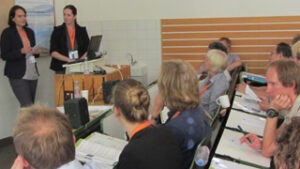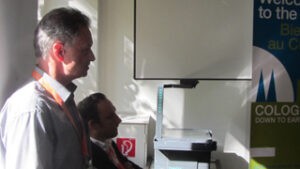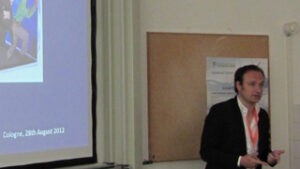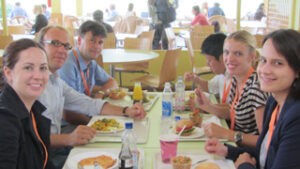Chair: Rolf D. Schlunze, Elmar Kulke
We conducted a special session on Management Geography at the 32nd International Geographical Congress. The SIEM session was so popular that the capacity of the room was not sufficient. Nonetheless, more than 50 people attended the session. Despite the limited time there was a lively discussion on what Management Geography is. We are grateful for the attendance and the remarks of Professor Andrew Jones, Professor Peter Meusburger and Professor Eike W. Schamp




Sessions
Kristina Trygg showed to what extent communication practices using modern IT tools determine the workplace of the knowledge-intensive service industry in Sweden.
Additionally we discussed practices that conflict the work-life balance of employees in the computing industry around the world.
Moira Conway and Marlies Kluike discussed the locational decisions of US investors in Germany and the implications for regional planning initiatives. The audience gave suggestions on improving the model by acknowledging the high mobility of the creative class within Germany.
Hans-Martin Zademach discussed the lending and investment practices and limits of intra-firm finance within the production networks of the German automotive sector. He suggested that assembler and supplier relations demand more collaborative practices to sustain the competiveness of the industry.
Lech Suwala suggested that the firm is not the only black box to be opened up by geographers. Actor-centered research on the perception and behavior of managers who impact corporate and regional development is needed. He introduced distinct aspects of environmental conditions for management including economic conditions, socio-cultural conditions, and managerial perception. In the discussion we realized that management geography can be only promoted by theoretical and methodological development.
Please find below selected pictures and the abstracts from the session (See also: 32nd International Geographical Congress (Book of Abstracts: GCG 18-01, pp. 577-579).
1) The geography of work in knowledge intensive service firms
Kristina Trygg (Stockholm University)
Her paper aims to understand the geography of work in knowledge intensive service firms. Geography of work refers to the location where work is conducted. Location can be at the office of the employer, the office of the client firm or in a third place including the homes of employees, and temporary meeting places like seminars, restaurants, hotels etc. The empirical data in this paper is derived from nine different firms in management and in PR/communication consultancy. The firms are knowledge intensive and located in Stockholm. The empirical data is interview data from interviews with nine persons responsible for the Human Resource management of the organization. Most of the interviewees are CEOs, partners or owners of the firms. Interviews, time diaries and questionnaire surveys at two of the firms have been done with the employees. This means that the data gives the perspective from the side of management of the firms as well as from the side of the employees. The results indicate the importance of being at the office for meetings, in order to gain informal and formal information. This may be interpreted as, on one hand, an effect of the learning and knowledge and working process in such firms to be strongly relying on interactive communications where face-to-face contact is seen as important. On the other hand, arguments for the importance of presence at the office can also be interpreted as an effect of power relations and management efforts to control the main resources of the firms, i.e. the human capital or employees. Physical presence and ‘shoulder-to-shoulder’ work are important means to support ‘team building’, sense of belong and commitment to the company’s visions. Most of the persons in the management team were reluctant to let employees work at home more than necessarily, for example when the kids where sick but all firms said that the employees had the opportunity to work from home. The paper considers the role of information technology for the geography of work. It is found that information technology is a tool helping the employees to structure their working life. Here smartphones have been a helpful implement. Additionally intranet tools such as Yammer are important for the employees. Technology is used to communicate and coordinate the employee’s work, not to make them work from distance.
2) The location of the creative class and US-subsidiaries in Germany
Moira Conway (CUNY Graduate Center), Marlies Kluike (University of Tübingen)
Germany is a very attractive target for US-investors for operations requiring a very specifically skilled workforce. However, within Germany there are considerable differences regarding locations where specific types of workforce reside. Therefore, areas of Germany where foreign subsidiaries could utilize the right local talent, due to its higher concentration, should be especially attractive to certain US-investors. Applying Florida’s creative class index to Germany, we endeavor to establish whether US-subsidiaries that can draw competitive advantage from the creative class are drawn more towards creative locations within Germany and differentiate between specific characteristics, such as subsidiary ownership structure. Focusing on US-subsidiaries that have recently established a presence in Germany to ensure that they have indeed been drawn to the creative class location and not the other way around, we test our propositions with the help of database information regarding US-subsidiaries in Germany, controlling for factors such as subsidiary headcount. From our findings we draw conclusions regarding foreign investors, locational decisions and regional planning initiatives.
3) Is finance ready for inter-firm collaboration? Insights from the automotive sector in a global production network perspective
Hans-Martin Zademach (University Eichstätt-Ingolstadt), Christian Baumeister (University Eichstätt-Ingolstadt)
This paper is concerned with the circulation of financial capital and cooperative means of firm finance in global production networks. Taking the emerging body of literature in the field of supply chain finance (SCF) as a conceptual point of departure, it argues that cooperative forms of firm finance increase the competitiveness and resilience of global production networks towards external shocks as occurred during the most recent financial crisis or due to changing legal regulations (e.g. Basel III). With regard to empirical work, the SCF literature states that the collection and description of more detailed case studies is still an open issue. The present contribution intends to help closing this gap with insights into the concurrent practices and limits of intra-firm finance within the production networks of the German automotive sector. These insights draw on preliminary results from an ongoing research project that aims to explore the motives, success factors and constraints of cooperative finance practices in and between different locations in varying development stages dint of both quantitative and qualitative work. The paper concludes with an outlook on the research agenda and a discussion of possible implications for both the firm level as well as regional development.
4) On Management Geography
Päivi Oinas (University of Turku), Lech Suwala (Humboldt Universität zu Berlin)
The emerging research field management geography calls attention to its foundations. Management geography is a new approach which seems to have close connections to three established fields, namely, (1) geography of the firm, (2) aspects of economic sociology with emphasis on embeddedness, and (3) the broad literature of management studies. Nevertheless, the connections between these research fields and their role in management geography remain to be scrutinized and established. Moreover, the precise meaning of the spatial environment of management activities has not been fully elaborated in the various theoretical frameworks. Management geography should not be just management studies attempted by geographers but should be defined as an eclectic framework taking a genuine geographical perspective on studying management. Management is taken as the activities that coordinate the operations of firms towards its goals. Managers – as individuals or in teams – hardly determine strategies alone but they are key agents in the strategy process. Our attempt in this paper is to outline a distinctively geographical perspective on management. This involves, first, distilling the valuable complementary insights from the three research fields mentioned above. Secondly, it involves the introduction of three distinct aspects of the environment providing environmental conditions for management, namely economic conditions, socio-cultural conditions, as well as managerial perception of the environmental conditions. This allows us to focus on how various aspects of the spatial environment influences management as well as how management takes the geographical environment into account in evaluating the external impact of the activities of the firm.
